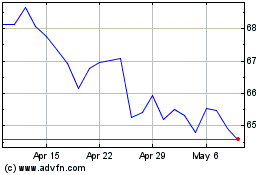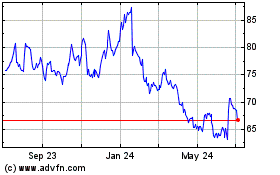Gilead Knew Hepatitis Drug Price Was High, Senate Says
December 01 2015 - 5:00PM
Dow Jones News
Concluding an 18-month investigation into how drug maker Gilead
Sciences Inc. set the price for its expensive new hepatitis C drug,
the U.S. Senate Finance Committee said the company knew its
$1,000-a-pill launch price would put the treatment out of reach of
many patients and cause "extraordinary problems" for government
health programs.
The 144-page committee report released Tuesday adds to a chorus
of criticism of escalating drug prices from patients, doctors,
insurers and some presidential candidates. U.S. congressional
committees also have opened inquiries into drug-pricing practices
by other companies including Valeant Pharmaceuticals International
Inc., and House Democrats have formed a drug-pricing task force to
explore ways to reduce costs.
The Senate committee reviewed about 20,000 pages of internal
Gilead documents and a trove of data from state Medicaid health
programs, the committee said. The probe primarily focused on
Sovaldi, which was introduced in late 2013, but also included
information about pricing of a second expensive hepatitis C drug
Gilead introduced in October 2014, Harvoni.
Gilead said in a statement that it disagreed with the
committee's conclusions and that the company "responsibly and
thoughtfully priced Sovaldi and Harvoni."
Among the documents cited in the Senate report is an internal
Gilead slide presentation from July 2013, before Sovaldi was
introduced, predicting that 24% of insurers and other U.S. payers
would restrict patient access to Sovaldi if it were priced at
$75,000 per patient, rising to 47% if priced at $90,000. The
presentation also anticipated that patient-advocacy groups and some
doctors would be critical of a price around $80,000.
Another document released by the committee is an email that
Kevin Young, Gilead's executive vice president for commercial
operations, wrote to colleagues in November 2013, shortly before
Sovaldi was cleared for sale by U.S. regulators: "Two sincere
requests…Let's not fold to advocacy pressure in 2014. Let's hold
our position whatever competitors do or whatever the
headlines."
The company ultimately set the price of Sovaldi at about $84,000
per patient for a standard 12-week treatment.
Gilead was "fully aware that as the prices kicked up, the number
of Americans treated and cured would go down," Sen. Ron Wyden, a
Democrat from Oregon and ranking member of the committee, said at a
news conference in Washington Tuesday. "Yet based on our
investigation, the company chose to put revenue ahead of
affordability, of accessibility for millions of patients."
Gilead said Tuesday that the drugs' prices were initially in
line with those for older hepatitis C treatments, and now cost less
because Gilead pays rebates and offers discounts to payers. The
company said it provides financial assistance to help uninsured
patients receive the drugs.
The committee also concluded that Gilead underestimated the
degree of restrictions that health insurers would impose as a
result of the price. State Medicaid programs paid $1.3 billion
before rebates on Sovaldi in 2014, yet less than 2.4% of the
roughly 700,000 Medicaid patients with hepatitis C were treated,
according to the report.
The committee report said Gilead set the price of Sovaldi as a
benchmark to "raise the price floor" for future hepatitis C drugs
including Harvoni, which costs about $94,500 per patient for a
12-week treatment. In clinical trials, both drugs had high rates of
curing patients infected with hepatitis C, a liver-damaging virus
that is spread by contact with the blood of an infected person.
Sen. Charles Grassley, a longtime industry watchdog and member
of the finance committee, and Sen. Wyden had sent a letter to
Gilead Chief Executive John Martin in July 2014 requesting a wide
range of documents about the company's pricing decisions. They said
in the letter that while Sovaldi had potential to help patients
with hepatitis C, its price was straining health-care budgets
including the federal Medicare and Medicaid programs.
Together, Sovaldi and Harvoni generated $14.2 billion in global
sales for the first nine months of 2015.
Gilead acquired an active ingredient shared by both drugs via
its $11 billion purchase in 2011 of Pharmasset, which developed the
drug.
Write to Peter Loftus at peter.loftus@wsj.com
Subscribe to WSJ: http://online.wsj.com?mod=djnwires
(END) Dow Jones Newswires
December 01, 2015 16:45 ET (21:45 GMT)
Copyright (c) 2015 Dow Jones & Company, Inc.
Gilead Sciences (NASDAQ:GILD)
Historical Stock Chart
From Mar 2024 to Apr 2024

Gilead Sciences (NASDAQ:GILD)
Historical Stock Chart
From Apr 2023 to Apr 2024
